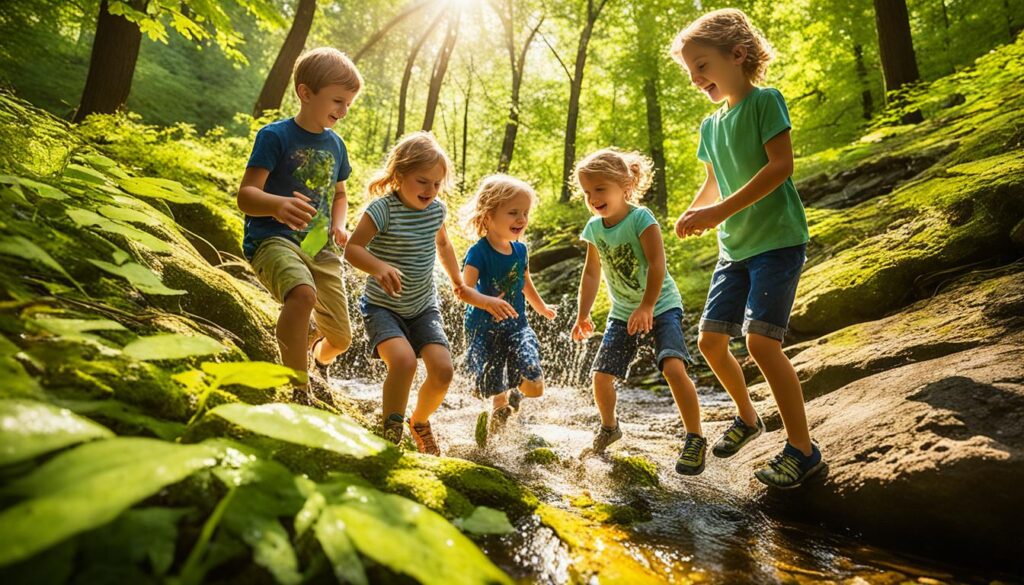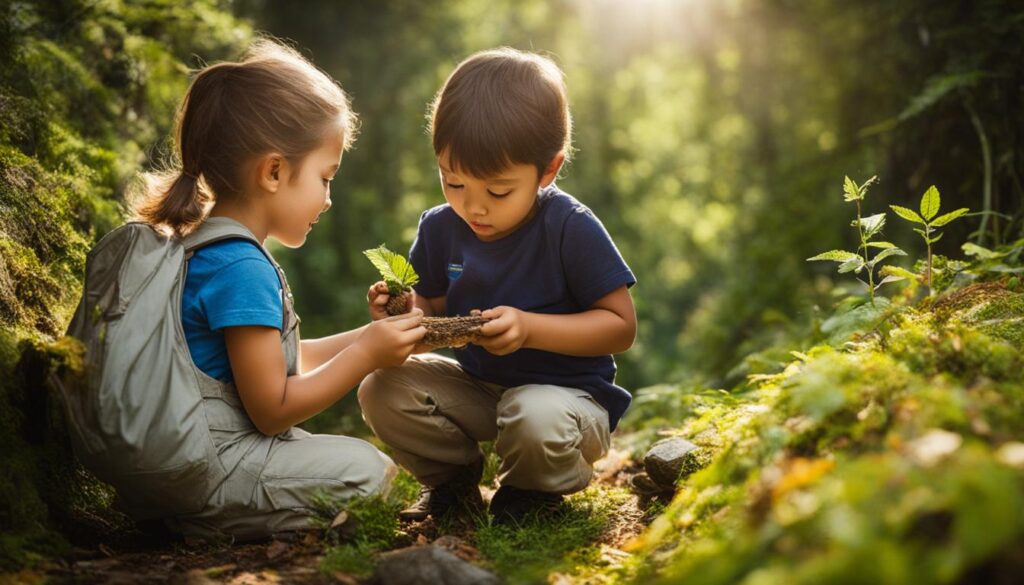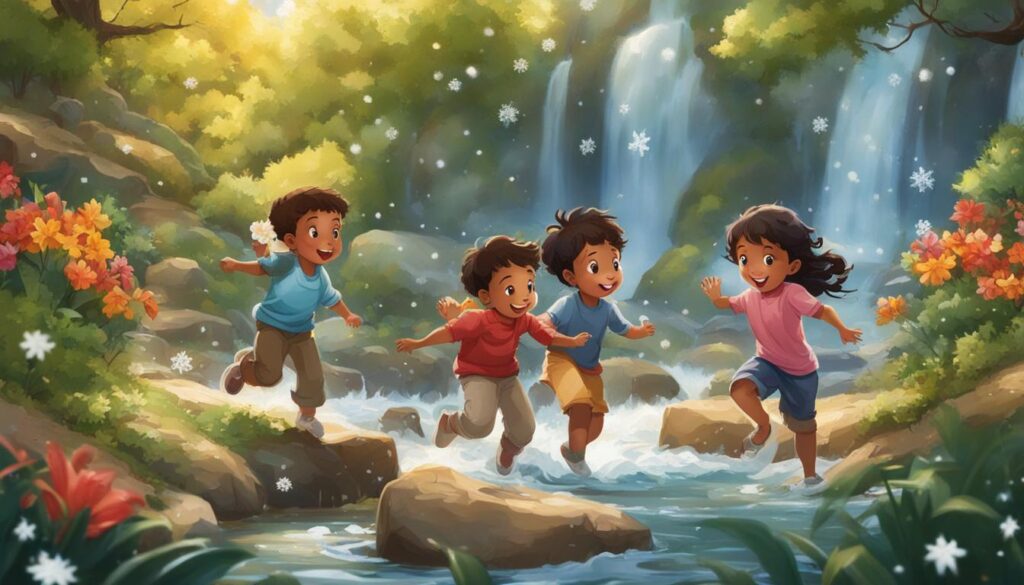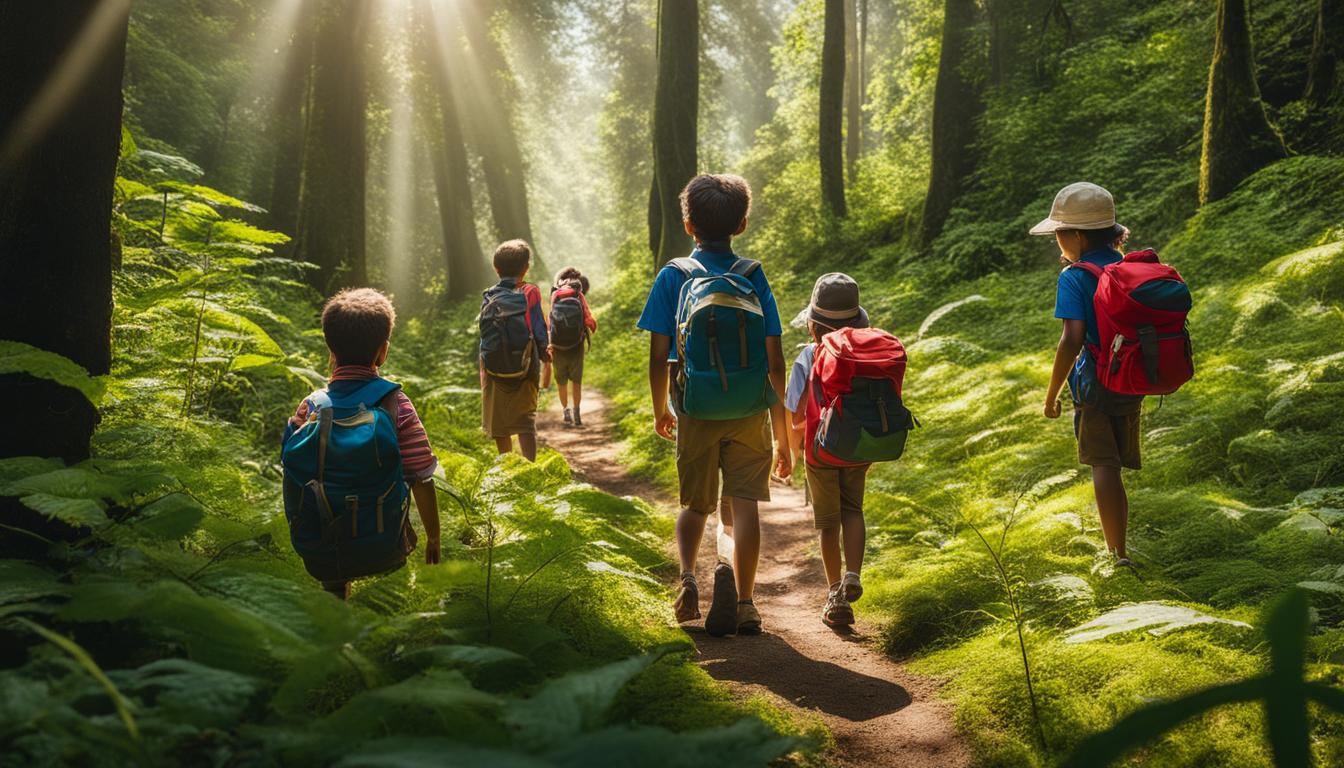Welcome to the exciting realm of outdoor learning adventures education, where exploration meets education and nature becomes the classroom. In today’s digital age, it is more important than ever to introduce children to the wonders of the natural world and provide them with meaningful experiences that promote holistic development. Outdoor education programs offer a unique opportunity for children to engage in nature-based learning experiences, fostering a deep connection with the environment and nurturing a love for outdoor exploration.
From thrilling outdoor classroom activities to immersive nature-based learning experiences, outdoor learning adventures education takes children on a journey where they develop essential skills and gain a profound appreciation for the world around them. Through hands-on exploration and play, children are immersed in the beauty and wonders of nature, igniting their curiosity, creativity, and problem-solving abilities.
Outdoor education programs provide a holistic approach to learning, integrating physical, emotional, and cognitive development. These programs are designed to engage children of all ages, from infants and toddlers to school-aged children, providing age-appropriate activities that align with their developmental stage. By embracing nature, children can enhance their physical activity levels, improve their language and communication skills, reduce stress and anxiety, develop problem-solving abilities, and stimulate sensory development.
Join us as we delve into the thrilling world of outdoor learning adventures. Discover the pivotal role of nature in child development, the power of creative explorations in igniting imagination, the impact of problem-solving abilities nurtured through nature’s lessons, and the importance of sensory development in the great outdoors. Explore the benefits of outdoor classroom activities and nature-based learning experiences across different age groups and learn how technology can be seamlessly integrated into outdoor education. Uncover the strategies for maximizing the benefits of outdoor play in various weather conditions, promoting environmental stewardship, and cultivating a lifelong enthusiasm for the outdoors.
Are you ready to embark on an unforgettable adventure? Let’s embrace nature and unlock the limitless possibilities of outdoor learning adventures education.
Key Takeaways:
- Outdoor learning adventures education combines exploration and education in the natural world.
- Outdoor education programs foster holistic development by engaging children in nature-based learning experiences.
- Outdoor activities enhance physical activity levels, language and communication skills, and reduce stress and anxiety in children.
- Nature offers valuable lessons in problem-solving, cognition, and sensory development.
- Outdoor learning adventures can be enjoyed by children of all ages, with age-appropriate activities tailored to their developmental stage.
Image related to Outdoor Learning Adventures
The Pivotal Role of Nature in Child Development
Nature plays a crucial role in the holistic development of children, offering a wide range of benefits that positively impact their growth and well-being. Outdoor play, in particular, provides numerous opportunities for children to thrive physically, emotionally, and cognitively. This section explores the various ways in which nature influences child development, focusing on the importance of outdoor play in boosting physical activity, fostering language and communication skills, and alleviating stress and anxiety.
Boosting Physical Activity Through Play
Engaging in outdoor play allows children to explore their surroundings, moving their bodies and engaging in physical activities that promote overall health and well-being. Nature provides the perfect setting for active play, offering open spaces, natural elements, and stimulating environments that encourage children to run, climb, jump, and explore. Regular physical activity not only enhances children’s motor skills, coordination, and balance but also contributes to the prevention of obesity and the development of lifelong healthy habits.
Fostering Language and Communication Skills
The outdoors presents a rich environment for language development and communication skills. When children engage in outdoor play, they are exposed to diverse vocabulary, natural sounds, and stimulating experiences that prompt curiosity and conversation. Exploring nature stimulates their imagination and encourages storytelling, while interacting with others in outdoor settings fosters socializing and the development of interpersonal communication skills. Furthermore, nature-based activities, such as nature walks or scavenger hunts, provide opportunities for language-rich experiences through observation, description, and reflection.
Alleviating Stress and Anxiety in Children
Nature has a calming effect on children, helping to alleviate stress and anxiety. The outdoor environment offers a sense of freedom and space, allowing children to unwind and relax. Exposure to natural surroundings, such as green spaces or calming natural sounds, has been shown to reduce stress levels and promote overall well-being. Outdoor play provides a healthy outlet for emotional expression and release, giving children the opportunity to reconnect with nature, engage in uninterrupted play, and find solace in the serene wonders of the natural world.
Nature in child development plays a vital role in promoting physical activity, fostering language and communication skills, and alleviating stress and anxiety. Incorporating outdoor play into children’s daily routines not only enhances their overall development but also instills a lifelong appreciation for the beauty and benefits of the natural world.
Creative Explorations: Igniting Imagination Outdoors
In the vast realm of outdoor learning adventures, creative explorations play a critical role in igniting children’s imagination and unlocking their artistic potential. Nature’s boundless wonders provide the perfect canvas for children to immerse themselves in imaginative play and unleash their innate creativity. From magical storytelling in the woods to creating masterpieces with natural materials, the possibilities for artistic expression in natural settings are endless.
The Magic of Imaginative Play
Imaginative play, also known as pretend or make-believe play, transports children to a world where anything is possible. It sparks their imagination, allowing them to invent stories, characters, and scenarios, fostering cognitive development and problem-solving skills. Outdoors, the natural environment becomes a stage for their creative endeavors, where they can become explorers, superheroes, or even fairies. Through imaginative play, children develop empathy, learn to navigate social interactions, and gain resilience as they navigate imaginary challenges.
Inspiring Artistry and Creativity in Natural Settings
Natural settings offer a rich tapestry of colors, textures, and materials that inspire artistic expression. Within the splendor of the great outdoors, children can discover leaves for collage, rocks for sculptures, and flowers for vibrant paintings. Engaging with natural elements fosters their appreciation for the beauty of the world and encourages them to see possibilities in unconventional materials. Whether they are creating mandalas from fallen petals or building structures with twigs, the outdoor environment stimulates their inherent creativity and nurtures their connection with the natural world.
Enhancing Problem-Solving Abilities with Nature’s Lessons
Exposure to outdoor environments plays a crucial role in developing problem-solving abilities in children. The ever-changing and unpredictable nature of outdoor settings creates opportunities for children to cultivate critical thinking and problem-solving skills through hands-on experiences. Nature’s lessons provide valuable insights and challenges that stimulate creative problem-solving approaches.
By engaging in nature-based learning activities, children learn to analyze and adapt to different situations, think critically, and collaborate with their peers. The problem-solving abilities honed in outdoor environments empower children to overcome challenges and find innovative solutions.
“When children face real-life problems in nature, they learn to think creatively and develop resilience. Nature’s lessons give them the confidence to tackle challenges head-on.” – Sarah Thompson, Outdoor Education Specialist
Practical activities that promote problem-solving skills through nature-based learning include:
- Building shelters using natural materials
- Creating nature-inspired art installations
- Designing and constructing bridges or dams using natural resources
- Navigating through a nature trail using a map or compass
- Identifying and solving environmental problems, such as pollution or habitat restoration
These activities encourage children to think critically, apply their knowledge and skills, and work collaboratively to find solutions. They provide a foundation for problem-solving abilities that can be transferred to various other aspects of life.
Through nature’s lessons, children develop resilience, adaptability, and perseverance – essential qualities for navigating the complexities of the modern world. Outdoor environments offer an immersive and dynamic platform for cultivating problem-solving skills in an enjoyable and meaningful way.
Sensory Development and the Great Outdoors
The great outdoors provides a rich and stimulating environment for children’s sensory development. Engaging in outdoor learning experiences allows children to explore and understand various textures and touch sensations, listen to nature’s symphony, and observe the vibrant colors of life.

Understanding Textures and Touch
Spending time in nature exposes children to a multitude of textures and tactile experiences. Whether feeling the rough bark of a tree, the soft petals of a flower, or the cool touch of a river rock, these sensory encounters enhance their cognitive and emotional development. The varied textures and touch sensations found in the great outdoors help children develop their sense of touch, spatial awareness, and fine motor skills.
Listening to Nature’s Symphony
Nature has its own symphony of sounds, from birds chirping to leaves rustling in the wind. By immersing themselves in outdoor environments, children have the opportunity to listen attentively, identifying and differentiating between various sounds. This auditory stimulation enhances their ability to discriminate between different pitches, tones, and rhythms, while also fostering an appreciation for the natural world.
Observing the Vibrant Colors of Life
Nature is a captivating canvas of vibrant colors. From the lush green foliage to the vibrant hues of flowers and the blue expanse of the sky, outdoor learning adventures provide children with a visually stimulating experience. By observing and appreciating the colors in nature, children develop their visual perception, color recognition, and artistic sensibilities.
Nature-Based Learning Activities for Different Age Groups
Infants and Toddlers: Sensory and Motor Skills Engagement
For infants and toddlers, nature-based learning activities focus on sensory and motor skills development. These activities provide an opportunity for young children to explore the textures, sounds, and sights of the natural world. Encourage infants and toddlers to engage with nature by:
- Playing with different textured materials like leaves, flowers, and rocks
- Listening to the sounds of birds, wind, and water
- Feeling different surfaces like grass, sand, and soil
- Engaging in motor skills activities such as crawling, walking, and climbing in safe outdoor spaces
Preschool Age: Discovery Through Active Play
For preschool-age children, nature-based learning activities offer opportunities for discovery through active play. These activities foster curiosity, independence, and a deeper connection with the natural environment. Encourage preschoolers to engage with nature by:
- Going on nature scavenger hunts to find different plants, insects, and textures
- Creating nature-inspired art using leaves, petals, and twigs
- Building structures using sticks, rocks, and natural materials
- Engaging in imaginative play, pretending to be animals or explorers
School-Aged Children: Experiential Learning and Responsibility
For school-aged children, nature-based learning activities focus on experiential learning and the development of responsibility. These activities provide opportunities for deeper environmental understanding and foster a sense of stewardship. Encourage school-aged children to engage with nature by:
- Participating in nature conservation projects, such as planting trees or cleaning up parks
- Going on nature hikes or camping trips to observe and learn about different ecosystems
- Engaging in citizen science projects, monitoring wildlife or collecting data on the environment
- Learning survival skills, such as building a shelter or identifying edible plants
Outdoor Learning Adventures Education
In today’s educational landscape, outdoor learning adventures have proven to be an invaluable tool for providing unique and impactful learning experiences. Outdoor education programs offer hands-on learning opportunities that go beyond the traditional classroom setting, allowing students to engage directly with the natural world and gain a deeper understanding of their surroundings.
These outdoor learning adventures provide numerous educational benefits for students of all ages. Research has shown that outdoor education enhances academic achievement by improving students’ cognitive abilities, critical thinking skills, and problem-solving capabilities. By actively participating in outdoor activities, students can apply theoretical knowledge in a practical and meaningful way, fostering a deeper comprehension of academic concepts.

Moreover, outdoor learning adventures contribute to the social-emotional development of students. By experiencing the natural environment, children develop a sense of environmental stewardship and appreciation for their surroundings. They also learn important life skills such as teamwork, resilience, and adaptability, which are essential for success in both academic and real-world settings.
By incorporating outdoor learning into formal education settings, schools can create a well-rounded educational experience that caters to the holistic growth and development of students. Outdoor education provides a balance between academic pursuits and the exploration of nature, allowing students to develop a deep connection with the natural world and cultivate a lifelong love for the outdoors.
In conclusion, outdoor learning adventures education offers a multitude of educational benefits that enhance students’ academic achievement, social-emotional development, and overall holistic growth. By embracing outdoor education programs, schools can provide students with transformative learning experiences that go beyond the confines of traditional classrooms, fostering a deep appreciation for the natural world and equipping students with the skills necessary for success in the 21st century.
Integrating Technology with Outdoor Education
The integration of technology with outdoor education opens up a world of possibilities for enhancing children’s learning experiences. By leveraging nature discovery apps and digital resources, educators can provide interactive and immersive experiences that deepen children’s understanding of the natural world and foster a love for outdoor exploration.
Using Apps to Enhance Nature Discovery
Nature discovery apps have revolutionized outdoor education by providing interactive tools that engage children in hands-on exploration. These apps offer a wealth of information about plants, animals, ecosystems, and geological formations, allowing children to learn about the natural world in a fun and interactive way. With features like augmented reality and virtual tours, children can dive into a virtual ecosystem, interact with virtual animals, and gain valuable insights into the wonders of nature. These apps also encourage children to observe and document their findings, fostering a deeper connection with the environment and promoting scientific inquiry.
Educational Opportunities Through Digital Resources
In addition to nature discovery apps, there is an abundance of digital resources available that can enhance outdoor education. Online educational platforms, interactive websites, and virtual field trips offer a wealth of educational content that complements outdoor learning adventures. These resources provide supplemental materials, videos, and quizzes that reinforce concepts learned during outdoor activities. They also offer opportunities for remote learning and allow children to continue their exploration and learning beyond the confines of the physical environment.
By integrating technology with outdoor education, we can bridge the gap between the digital world and the natural world, creating a powerful learning experience that combines the best of both worlds.
Table: Examples of Nature Discovery Apps and Digital Resources
| Nature Discovery Apps | Digital Resources |
|---|---|
| 1. Seek | 1. National Geographic Kids |
| 2. iNaturalist | 2. BBC Nature |
| 3. MyNature | 3. Exploring By The Seat Of Your Pants |
| 4. PlantSnap | 4. Discovery Education |
| 5. Audubon Bird Guide | 5. National Park Service |
These examples are just a few among many available resources that can enhance children’s learning experiences in outdoor education settings. By incorporating these technologies, educators can create dynamic and engaging lessons that captivate children’s curiosity and inspire a lifelong love for the natural world.
Maximizing the Benefits of Outdoor Play Across Weather Conditions
Outdoor play offers numerous benefits for children’s physical, cognitive, and emotional development. Regardless of the weather conditions, embracing the elements and engaging in outdoor activities can provide valuable learning opportunities. Whether it’s raining, snowing, or the sun is shining brightly, children can continue to reap the rewards of outdoor play throughout the year. Here are some practical tips for making the most of outdoor play in any weather:
Embracing the Elements: Learning in Rain, Snow, and Sunshine
Each weather condition brings its own unique experiences and learning opportunities for children:
“In every walk in nature, one receives far more than he seeks.” – John Muir
- Rain: Put on rain boots and jump in puddles, observe how rainwater shapes the environment, and explore the different sounds and scents that come with a rainy day.
- Snow: Build snowmen, engage in snowball fights, and discover how snow can transform the landscape. Encourage children to examine snowflakes and appreciate the beauty of winter.
- Sunshine: Enjoy outdoor activities such as picnics, nature walks, and gardening. Teach children about the importance of sun safety while enjoying the warmth and energy provided by sunlight.
Adapting Activities for Year-Round Engagement
Adapting outdoor activities to suit different weather conditions ensures year-round engagement and maximizes the benefits of outdoor play:
- Indoor-outdoor transitions: Create a seamless transition between indoor and outdoor spaces by incorporating elements of nature indoors. Use natural materials for sensory play, bring plants into the classroom, and use nature-inspired art and decorations.
- Weather-themed activities: Integrate weather-related themes into activities to enhance children’s understanding of different weather conditions. For example, create art projects that reflect rainbows, snowflakes or sunny landscapes.
- Layered clothing: Dress children appropriately for each weather condition to ensure their comfort and safety. Layering clothing allows for flexibility in adapting to changing weather and temperature fluctuations.
- Flexible schedules: Incorporate outdoor play into the daily routine, making adjustments based on weather conditions. Provide dedicated outdoor playtime, allowing children to engage in unstructured, imaginative play amidst nature.
Remember, outdoor play should be a year-round experience, allowing children to connect with nature and harness the benefits it offers, regardless of the weather conditions. By embracing the elements and adapting activities, children can continue to engage in outdoor play and experience the wonders of nature, fostering their holistic development.

Environmental Stewardship and Outdoor Education
Environmental stewardship plays a vital role in outdoor education, instilling a sense of responsibility and care for the environment in children. Through outdoor learning adventures, children have the opportunity to develop a deep connection with nature and learn about sustainable practices that promote the well-being of our planet.
Outdoor education programs can actively incorporate sustainable practices and teach children about the importance of conserving natural resources. By engaging in hands-on activities like gardening, recycling, and conservation projects, children learn firsthand how their actions impact the environment.
By fostering a deeper understanding of ecological systems and conservation efforts, outdoor education helps children become environmentally conscious individuals who actively contribute to creating a sustainable future. They develop a strong sense of environmental stewardship, realizing the significance of protecting and preserving the natural world for generations to come.
“We do not inherit the earth from our ancestors; we borrow it from our children.” – Native American Proverb
Outdoor education provides a platform for children to learn about the interconnectedness of all living things and the impact of human actions on the environment. It encourages them to develop a sense of responsibility and empowers them to make positive choices that benefit both themselves and the planet.
Through outdoor learning adventures, children gain firsthand experiences of the natural world, developing a deep appreciation for its beauty and significance. They understand the delicate balance of ecosystems and the importance of protecting biodiversity.
The integration of environmental stewardship in outdoor education fosters a generation of individuals who are motivated to create positive change. By instilling a love for the environment and a sense of responsibility, outdoor education equips children with the knowledge and skills to become environmental advocates and leaders in sustainable practices.
| Sustainable Practices in Outdoor Education | Benefits |
|---|---|
| Conservation projects | Raise awareness about environmental issues |
| Energy-saving initiatives | Teach children the importance of reducing energy consumption |
| Composting and recycling programs | Promote waste reduction and resource conservation |
| Outdoor nature exploration | Enhance understanding of ecological systems and interconnectedness |
| Sustainable gardening | Teach children about food production and the importance of organic practices |
By embracing environmental stewardship in outdoor education, we empower children to become responsible global citizens who actively contribute to building a sustainable future. Through their experiences in outdoor learning adventures, children develop a lifelong commitment to taking care of the environment, ensuring a harmonious coexistence between humans and nature.
Cultivating Lifelong Outdoor Enthusiasm
Cultivating Lifelong Outdoor Enthusiasm focuses on nurturing a love for the outdoors in children that lasts a lifetime. It emphasizes the importance of encouraging exploration and curiosity in natural settings, as well as establishing outdoor habits and traditions. By fostering a connection with nature from an early age, children develop a lifelong enthusiasm for the outdoors that enriches their lives in countless ways.
Encouraging Exploration and Curiosity
Encouraging children to explore their natural surroundings sparks their innate curiosity and instills a sense of wonder. Nature provides an abundant playground for discovery, where children can observe plants, animals, and natural phenomena. Encouraging exploration fosters a sense of awe and inspires children to ask questions, seek answers, and develop a deeper understanding of the world around them. This curiosity-driven mindset sets the foundation for a lifelong love of learning and a deep connection with nature.
Establishing Outdoor Habits and Traditions
Establishing outdoor habits and traditions helps integrate the outdoors into children’s daily lives. Whether it’s a family hike on weekends, gardening together, or simply spending time in nature, these habits create a consistent and meaningful connection with the natural world. Outdoor traditions, such as annual camping trips or beach cleanups, reinforce the value of environmental stewardship and create lasting memories. These habits and traditions form rituals that children associate with joy, relaxation, and a sense of belonging in the natural world.

Multisensory Learning with Shichida Australia
Multisensory Learning with Shichida Australia explores the concept of multisensory learning and its role in outdoor education. Shichida Australia, a renowned educational institution, is at the forefront of incorporating multisensory learning experiences into outdoor activities. By engaging multiple senses, such as sight, hearing, touch, and movement, this approach enhances children’s cognitive abilities, sparks creativity, and fosters holistic development.
Through outdoor education programs, Shichida Australia creates a rich sensory environment that stimulates children’s senses and promotes meaningful learning experiences. In this multisensory approach, children engage with nature and the world around them, igniting their curiosity, imagination, and desire to explore. By integrating various sensory modalities, Shichida Australia allows children to develop a deeper understanding of concepts, build strong neural connections, and enhance their overall learning capabilities.
The use of multisensory learning in outdoor education aligns perfectly with Shichida Australia’s philosophy of nurturing children’s potential. By providing hands-on, experiential learning opportunities that engage all senses, this approach helps children to make connections between different elements of their environment, develop problem-solving skills, and strengthen their cognitive abilities.
Shichida Australia’s commitment to multisensory learning in outdoor education sets the stage for transformative educational experiences. By engaging all the senses, children are able to fully immerse themselves in their learning journey, fostering a deeper connection with nature and their surroundings. This approach not only amplifies the educational benefits of outdoor learning but also cultivates a lifelong passion for exploration and a love for the natural world.
Prepare your child for a multisensory learning adventure with Shichida Australia and unlock their full potential to thrive in an ever-changing world.
Adventure Awaits: The Role of Outdoor Educational Facilitators
Adventure Awaits: The Role of Outdoor Educational Facilitators explores the crucial role played by outdoor educational facilitators in providing enriching outdoor learning experiences. These dedicated professionals serve as guides and mentors, facilitating meaningful interactions with the natural environment and fostering a love for experiential learning.
Outdoor educational facilitators possess a unique set of skills and expertise that enable them to create engaging and educational outdoor experiences. They have a deep understanding of the principles of outdoor education and experiential learning, allowing them to design and implement programs that promote active exploration, critical thinking, and problem-solving.
Experiential learning lies at the core of outdoor education, and facilitators play a key role in facilitating this process. They encourage hands-on experimentation, reflection, and the application of knowledge in real-world settings. By creating a supportive and inclusive learning environment, facilitators empower children to take risks, overcome challenges, and develop a sense of resilience.
Qualified outdoor educational facilitators also possess essential safety and risk management skills. They ensure that children engage in activities that are age-appropriate, supervised, and conducted in accordance with safety protocols. This enables children to explore the outdoors with confidence and fosters a sense of trust between facilitators, children, and parents.
Furthermore, outdoor educational facilitators serve as role models for children, inspiring them to develop a lifelong love for nature and a commitment to environmental stewardship. Through their passion for the outdoors, facilitators encourage children to appreciate the natural world, fostering a sense of environmental awareness and responsibility.
Outdoor educational facilitators have a profound impact on children’s engagement and learning outcomes in outdoor settings. They create immersive and interactive experiences that capture children’s curiosity, stimulate their senses, and ignite their natural love for learning. By providing guidance, encouragement, and support, facilitators help children develop essential life skills, such as teamwork, communication, problem-solving, and decision-making.
Ultimately, outdoor educational facilitators play a crucial role in shaping children’s experiences in the great outdoors. Through their dedication and expertise, they create unforgettable learning adventures that inspire a lifelong passion for nature, instill a sense of curiosity and wonder, and nurture the holistic development of children.
Conclusion
Throughout this article, we have explored the thrilling world of outdoor learning adventures and the immense benefits they offer for children’s holistic development. From the pivotal role of nature in child development to the enhancement of problem-solving abilities through nature’s lessons, outdoor learning adventures have proven to be a powerful tool for nurturing children’s growth.
By embracing nature and incorporating outdoor activities into children’s lives, we can ignite their imagination, enhance their language and communication skills, and alleviate stress and anxiety. The great outdoors also offers a wealth of sensory experiences, stimulating children’s cognitive and emotional development.
From infants and toddlers to school-aged children, there are nature-based learning activities catered to different age groups. Outdoor learning adventures also play a crucial role in formal education, providing hands-on learning and academic enrichment. Additionally, by integrating technology with outdoor education, we can further enhance children’s understanding of the natural world.
To maximize the benefits of outdoor play, it is essential to embrace different weather conditions and adapt activities for year-round engagement. Furthermore, outdoor education programs can foster environmental stewardship and cultivate lifelong outdoor enthusiasm by encouraging exploration, establishing outdoor habits, and traditions.
In conclusion, outdoor learning adventures education offers extraordinary opportunities for children to thrive and grow. We urge you to embrace nature and provide children with the thrilling world of outdoor learning adventures. Let us create a future where children can connect with nature and develop into well-rounded individuals.
FAQ
What are outdoor learning adventures?
Outdoor learning adventures are educational experiences that take place in natural environments, such as forests, parks, or mountains. These adventures provide opportunities for hands-on learning and experiential education, allowing participants to engage with nature and explore the natural world.
Why are outdoor education programs important?
Outdoor education programs offer a unique and effective way for individuals of all ages to learn and grow. These programs provide opportunities for experiential learning, hands-on activities, and the development of skills such as problem-solving, teamwork, and resilience. Outdoor education programs also promote a deeper connection and appreciation for the natural world.
What are nature-based learning experiences?
Nature-based learning experiences involve engaging with the natural environment to facilitate learning and understanding. These experiences can include activities such as nature hikes, wildlife observation, gardening, and ecological experiments. Nature-based learning experiences provide a holistic approach to education, incorporating physical, emotional, and cognitive development.
What are outdoor classroom activities?
Outdoor classroom activities are educational activities that take place in an outdoor setting, rather than a traditional indoor classroom. These activities can range from scientific experiments and nature exploration to physical fitness and team-building exercises. Outdoor classroom activities provide a dynamic and engaging learning environment while promoting a connection with nature.
What are some examples of outdoor learning activities for children?
Outdoor learning activities for children can include nature scavenger hunts, plant and animal identification, outdoor art projects, gardening, and outdoor science experiments. These activities allow children to explore and learn about the natural world while engaging their senses and fostering creativity.
Are there environmental education programs available for adults?
Yes, there are environmental education programs available for adults, designed to promote a better understanding and appreciation of the environment. These programs often involve workshops, seminars, and hands-on activities that focus on topics such as sustainability, conservation, and ecological awareness.
How does outdoor education curriculum differ from traditional classroom curriculum?
Outdoor education curriculum prioritizes experiential learning and hands-on activities in natural environments. It often integrates elements of science, environmental studies, physical education, and social-emotional learning. Traditional classroom curriculum, on the other hand, primarily focuses on academic subjects taught within an indoor setting.
What is experiential learning in the outdoors?
Experiential learning in the outdoors is an educational approach that emphasizes learning through firsthand experiences in nature. It involves active participation, problem-solving, and reflection. Experiential learning in the outdoors allows individuals to develop new skills, gain knowledge, and deepen their understanding of the natural world.
Are there resources available for outdoor education?
Yes, there are numerous resources available for outdoor education. These include books, websites, lesson plans, and teaching guides that provide ideas for outdoor learning activities, nature-based curriculum, and environmental education resources.
How can outdoor learning activities benefit children’s development?
Outdoor learning activities provide opportunities for physical exercise, cognitive development, creativity, and social-emotional growth. They can enhance problem-solving and critical thinking skills, foster a connection with nature, and promote overall well-being and resilience in children.
What is the role of outdoor educational facilitators?
Outdoor educational facilitators play a crucial role in providing enriching outdoor learning experiences. They have the knowledge and expertise to guide participants through activities, ensure safety, facilitate reflection and debriefing, and connect participants with the natural environment. Outdoor educational facilitators are instrumental in creating engaging and memorable outdoor learning adventures.
Source Links
- https://www.shichida.com.au/blog/embracing-natures-impact-on-child-development/
- https://brightchamps.com/blog/kids-outdoor-play/
- https://www.4-c.org/outdoor-activities/embracing-the-outdoors/

